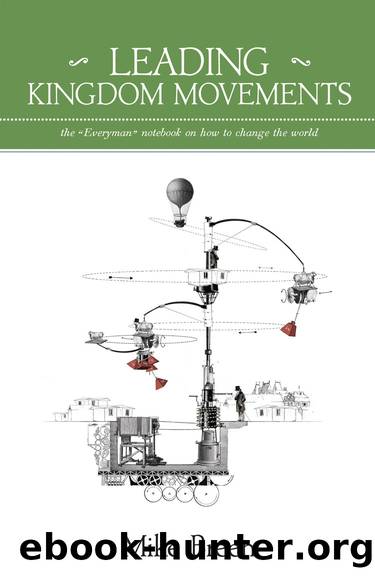Leading Kingdom Movements by Mike Breen

Author:Mike Breen
Language: eng
Format: mobi
Tags: Christian
ISBN: 9780984664375
Published: 2013-03-02T00:00:00+00:00
8
PAUL:
MESSAGE
Message: Communicating outwardly what you have experienced inwardly so that others can receive it transformationally.
Acts 13:1-3
Now in the church at Antioch there were prophets and teachers: Barnabas, Simeon called Niger, Lucius of Cyrene, Manaen (who had been brought up with Herod the tetrarch) and Saul. While they were worshiping the Lord and fasting, the Holy Spirit said, “Set apart for me Barnabas and Saul for the work to which I have called them.” So after they had fasted and prayed, they placed their hands on them and sent them off.
Paul was once in the demolition business, but now he was in the building business. Destruction becomes construction. When we first saw him in Acts 8, his mission was to destroy the church, going from house to house and demolishing the church. So it is interesting that he later described himself as a builder. At one end, he was a man with a wrecking ball; at the other, he was a man with a trowel. At one end, he held a sledgehammer, at the other a hammer and mallet.
As we have seen, Jesus accosted Paul on the road to Damascus, and Paul probably spent 13 years with nothing to show for it. In the end, Barnabas found Paul, and they spent a year of incredible harvest in Antioch, the place where believers were first called Christians.
Other leaders of the church in Antioch, along with Paul and Barnabas, started to gather regularly. The text indicates that structure was emerging. The church had leaders. It also seems to suggest very matter-of-factly that worship and prayer were regular routines for these leaders. In movements, spontaneity always gives rise to some loose governing structure, in the same way that structure must always give rise to spontaneity. Neither is sustainable without the other.
CONTINUUMS, NOT COMPARTMENTS
Organization was beginning to emerge. It isn’t that things are either ORGANIC or ORGANIZED. These things don’t exist in compartments; rather, they always co-exist on a continuum. The same is true of STRUCTURE and SPONTANEITY. It seems that after a year of a great harvest in Antioch, there was a need to spend time focusing on structure and organization. Not to the point where things became hardened and inflexible, but to the point where organization and structure could support all the life that was being birthed.
It’s a delicate balance, that one.
The more we think about continuums and the less we think about compartments, the more effective we will be at leading movements. (We aren’t going to talk about all that quite yet, but it’s coming.)
Paul and Barnabas launch into their mission.
We sometimes forget that Barnabas was the leader right now. He was the elder and the one who was more mature and experienced, and they went to his “Jerusalem”—his home in Cyprus. Jesus had made it clear that you go to Jerusalem, Judea, Samaria, and then the ends of the earth. So they began their mission not in some foreign land but among the people Barnabas already knew.
You don’t become a missionary by buying a plane ticket.
Download
This site does not store any files on its server. We only index and link to content provided by other sites. Please contact the content providers to delete copyright contents if any and email us, we'll remove relevant links or contents immediately.
Fearfully and Wonderfully Made by Philip Yancey & Paul Brand(586)
Christian Ethics by Wilkens Steve;(571)
Numbers by Ronald B. Allen(503)
The World from 1450 To 1700 by Wills John E.;(499)
Christian Ethics: An Introduction to Biblical Moral Reasoning by Wayne Grudem(478)
How to Read Slowly by James W. Sire(457)
God and the Multiverse by Victor J. Stenger(446)
Morality by Jonathan Sacks(431)
Monastic Archaeology by Unknown(407)
The Disabled Church by Rebecca F. Spurrier;(396)
Jesus: A New Vision by Whitley Strieber(369)
Critical Writings by Joyce James;(366)
Death of the Doctor by Unknown(365)
Redeeming Sociology by Vern S. Poythress(364)
Amish Grace by Donald B. Kraybill & Nolt Steven M. & Weaver-Zercher David L(360)
The Technological System by Jacques Ellul(352)
Children of Lucifer; The Origins of Modern Religious Satanism by Ruben van Luijk(351)
The Catholic Case for Trump by Austin Ruse(334)
The Church in the Early Middle Ages by G.R. Evans(332)
